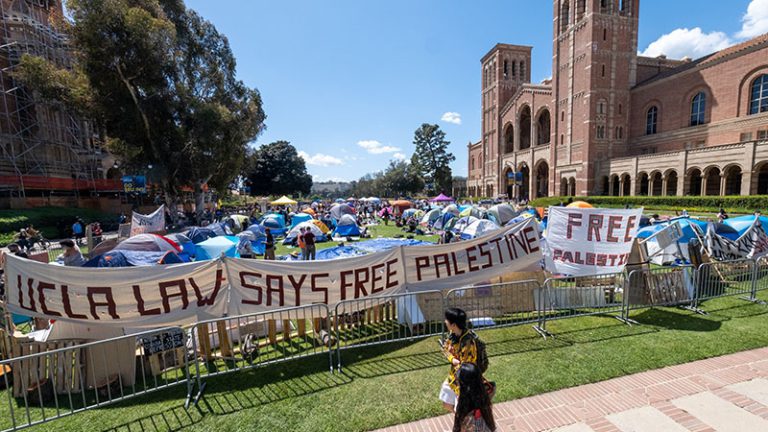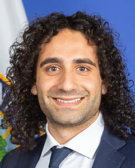
Since October 7, 2023, American colleges and universities have repeatedly found themselves at the center of escalating political pressure amid student activism related to the Gaza war. As calls for an end to American-sponsored destruction of Palestinian life in Gaza grew, the response from university leaders quickly shifted as large donors and far-right members of Congress berated college presidents for not shutting down student speech supporting Palestinian rights. Instead of defending the foundational principle of academic freedom and the importance of institutional independence from financial and political interests, one after the other, many high-profile college presidents chose to crumble to demands to silence and punish pro-Palestine students rather than to stand firm in defense of their institutions’ supposed values. Now, faced with even more extreme threats from President Donald Trump—who has made attacking higher education a prominent aspect of his political rhetoric—this instinct to appease power rather than resist it is not just a failure of moral courage, it is a dangerous step toward authoritarianism.
The recent wave of political interference in academia has extended far beyond rhetoric. College presidents have faced interrogations by Congress, demands for faculty firings, and pressure to suppress and reprimand student activism. Legislative efforts at the federal and state levels have threatened funding for institutions that refuse to align with extremist conservative political agendas. In some cases, these threats have escalated into direct action: cuts to diversity, equity, and inclusion programs; withholding of federal funding; and arrests, investigations, suspensions, and terminations of students and faculty simply for expressing political views.
Instead of fighting back, too many university leaders have chosen compliance over courage. Harvard’s January 2025 preemptive adoption of the International Holocaust Remembrance Alliance (IHRA) definition of anti-Semitism, which has been widely criticized even by its own author for conflating legitimate criticism of Israel with hate speech, stands as a stark example of “anticipatory obedience” to autocratic governance. To be clear, Harvard’s decision to adopt IHRA was not made in response to student actions, but seemingly out of fear that right-wing politicians and donors would target the university if its leaders did not fall in line. Despite its best efforts to comply with Trump’s wishes, Harvard remains in the administration’s crosshairs.
Columbia also finds itself in similar dire circumstances. In early February 2025, the Trump administration announced an “investigation” into the university’s handling of complaints about anti-Semitism, and just a month later declared it was freezing $400 million in federal funding—despite the fact that legitimate investigations into civil rights complaints traditionally require months of fact-finding and evidence building. Then, the Trump administration sent what could only be identified as a ransom letter, to extort Columbia into complying with the political desires of Donald Trump, which is to say the complete crackdown on any pro-peace speech that is critical of the Israeli government. Columbia shamefully complied, and its board subsequently forced the interim president to resign.
What is clear is that despite every effort by schools like Columbia and Harvard to appease the political whims of Donald Trump, the results of this obedience should not be a surprise—historians have repeatedly told us what we can expect to happen ultimately. Unfortunately for all of us, the leaders of these prestigious institutions do not seem to listen to their faculty either, as they comply with Trump’s demands in complete disregard for the university’s right to autonomy. Until our higher education leaders strengthen their resolve and follow the bravery of their students and faculty, America’s shift from liberalism to authoritarianism will not be stopped.
The consequences of this anticipatory obedience are dire. By ceding ground preemptively, universities are not just weakening their own moral and intellectual standing—they are undermining the very foundations of academic freedom and institutional autonomy. Each instance of anticipatory obedience normalizes external political influence in campus governance, making it easier for future attacks on academic freedom to succeed.
The threat is not theoretical. Around the world authoritarian regimes have followed a familiar playbook of targeting democratic institutions, including universities, reshaping them to align with certain political ideologies. As independent inquiry is stifled, dissent is punished, and education becomes a tool of state propaganda, the repression and weaponization of government will expand to target those standing up for Palestinian rights to encompass other vulnerable communities advocating for immigrant rights, LGBTQ+ rights, and perhaps ultimately to any opposition to the Trump administration’s policies. The failure of American higher education leaders to resist political coercion is deeply alarming. By complying with ideological demands, they are laying the groundwork for precisely the kind of authoritarian control that universities should exist to challenge.
Colleges and universities must reverse course. Higher education leaders must reject the instinct to collaborate with political forces seeking to limit inquiry and speech. They must defend faculty and students from politically motivated attacks—not sacrifice them to avoid controversy. Most important, they must recognize that their role is not to maintain political favor but to safeguard the values of critical thinking, open discourse, and academic independence. In moments like these, silence and accommodation are not signs of prudence—they are complicity in the erosion of democracy itself.
If American higher education continues down this path of anticipatory obedience, it risks becoming an institution that no longer educates citizens to question power—but trains them only to submit to it.
The views expressed in this publication are the author’s own and do not necessarily reflect the position of Arab Center Washington DC, its staff, or its Board of Directors.
Featured image credit: Shutterstock/Ringo Chiu

